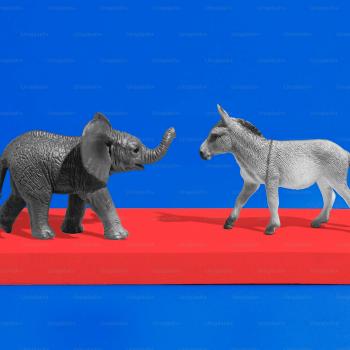Salt Lake City, Utah– Last Tuesday, the Faith & Media Initiative announced the start of a new fellowship program. The fellowship, composed of thought leaders coming from a variety of cultural and religious backgrounds, is aimed at one important task: representing faith accurately in media.
Faith is a tricky thing to represent. Even within a singular religious tradition, such as Islam, Buddhism, or Christianity, practitioners will disagree on what the tradition means and how to faithfully practice it. And even across religious boundaries, or between religious and nonreligious people, representing another’s faith tradition (or lack thereof) is often fraught with misunderstandings or even ill intent.
Meet the Fellows
The fellows come from a variety of backgrounds, from business to academia, from filmmaking to human rights leaders. The fellows also come from a diverse set of religious backgrounds, as well. The following is taken from the Faith & Media Initiative Press Release:
• Rabbi Elan Babchuck: a writer, speaker and expert in religious innovation and
faith-based leadership. He is the Founding Executive Director of Glean Network,
an incubator with Columbia Business School to empower faith leaders to build
innovative, values-driven ventures.
• Elonda Clay: a poet, librarian, scholar of religion and meditation teacher whose
work explores the intersection of faith, media and digital ethics. She is Director of
the Library at Methodist Theological School in Ohio.
• Craig Detweiler: an award-winning filmmaker, writer, professor, educator,
administrator and speaker whose work explores the intersection of faith,
storytelling, media and technology. He is Dean of the College of Arts at Grand
Canyon University.
• Robert P. George: a leading constitutional law scholar, philosopher and
respected public intellectual known for his work on religious liberty, civil discourse
and bipartisan engagement. He serves as the sixth McCormick Professor of
Jurisprudence and director of the James Madison Program in American Ideals
and Institutions at Princeton University.
• Dr. Lipi Roy, MD, MPH: a nationally recognized physician, public health expert
and voice on addiction, mental health and homelessness. She is a news medical
contributor with over 350 live television appearances.
• Simran Jeet Singh: a nationally recognized scholar, author and speaker whose
work centers on religious diversity, civil rights and the Sikh American experience.
He is the Assistant Professor of Interreligious Histories at Union Theological
Seminary and author of the national bestseller The Light We Give: How Sikh
Wisdom Can Transform Your Life.
• Lynn Swain: a pracademic with a Master’s degree in Neuroscience of
Leadership and a global specialist on trust, resilience and human connection.
She is CEO of Symbiota Leadership Institute.
• Katrina Lantos Swett: an internationally respected human rights leader, public
intellectual and advocate for international religious freedom. She is the President
of the Lantos Foundation for Human Rights and Justice, founded in 2008 to
honor her father, Congressman Tom Lantos.
• Asma Uddin: a legal scholar, author and public commentator focused on
religious liberty, women’s rights and the integration of faith into daily life. She is
the author of When Islam Is Not a Religion: Inside America’s Fight for Religious
Freedom (2019) and The Politics of Vulnerability: How to Heal Muslim-Christian
Relations in a Post-Christian America (2021).
Why Have Faith and Media?
Many in modern society unfortunately assume that faith must be kept private. This secularity as private belief extends far beyond the real life interactions that people have. Even when it comes to media, be it movies or journalism, religion is sidelined, eclipsed for “more important” themes like family, culture, economy, politics, etc. And even when religion is not eclipsed, it is often misrepresented.
As a Christian growing up in the US, I know this all too well. Just thinking about Netflix alone, I recall a good number of shows that left Christians feeling slighted. There was The Temptation of Christ (2019), a show which depicted Jesus as a gay man. There was also the 2020 series Messiah and the more recent movie, Mary (2024).
Even aside from straightforward media, there are artistic performances which dance on the line between provocative art and anti-religious angst. I think back to the Paris Olympics performance last year. A group of performers acted out a scene which was strangely familiar to Da Vinci’s Last Supper painting. Many Christians went up in arms about this performance. Others insisted that the performance was inspired not by Da Vinci but by the Feast of Dionysus.
There are also times in which religion is exploited to encourage violence. I think of Samuel Paty, a schoolteacher in France who allegedly showed his students satirical cartoons of the prophet Muhammad. In Islam, visual depictions of the prophet is forbidden. When these rumors (later confirmed as lies) got out on social media, Paty was beheaded by then-18 year old Abdoullakh Anzorov. There is concern in both how religious convictions get exploited to wrongly harm others in the media, as well as how atrocities committed by some are depicted in media to negatively frame all members of that religion.
The Need for Faith and Media
Many Western societies, in which media is largely sourced and produced, are increasingly diverse. And with diversity comes challenges.
The stories that we tell about ourselves and our neighbors matters a great deal. But if media does not give us the conceptual toolkits and practical skills to talk about and understand our neighbors’ faith, can we truly navigate diversity? Religion and spirituality are fundamental to who we are as humans. Many times, our political and cultural values are outward expressions of what we believe we shall face after death, or what we believe about the cosmos and the transcendent.
So, there is a genuine need for faith and media. As the executive director of the Faith and Media Initiative, Angela Redding says,
“At a time of global division, despair, and health crises, emerging research is clearly linking faith and spirituality to greater flourishing and wellbeing. Media and faith-forward leaders have a responsibility to illuminate the numerous ways faith can be a positive, unifying force.”
However, with this genuine need comes difficulty.
Do We Really Want Accuracy?
Faith and media can become an essential pillar of a healthy, pluralistic society. But when we talk about highlighting faith as “a positive, unifying force,” we also risk eclipsing how faith can be a negative, divisive force in society. Sometimes, accurate representation won’t represent the best of what a faith tradition can be.
My mind goes immediately to the various historical sins that Christianity has committed. The popular show Longmire recently explored the horrors of American boarding schools, predominantly Catholic institutions. White settlers ripped indigenous children from their families and culture and assimilated them into white Christian ways of being, often violently.
Religion and colonialism is also an important theme which requires accurate representation. Not only for the colonial and postcolonial nature of Christian missions in the past and present, but also the colonial realities of Islam in Africa. Media often portrays the patriarchal, sexist practices present in Christian doctrine and practice, but rarely accurately addresses the sexism present in Buddhist teaching and tradition.
These things should not condemn religious traditions. Militant secularism is not an appropriate alternative. Because nonreligion is capable of the same if not more violence, prejudice, and dehumanization as religion. We must balance accuracy, truth, artistry, and charity to “do” faith and media rightly. I look forward to following the work of this fellowship!












